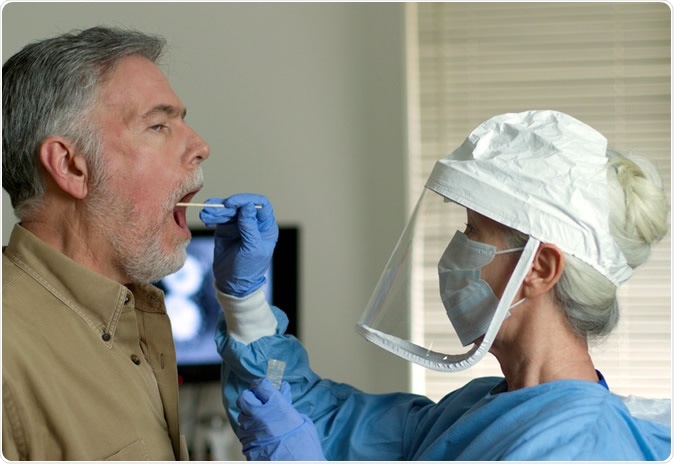Saliva is one of the ways people can transmit the novel coronavirus to others, but it may also help combat coronavirus disease (COVID-19). Scientists are now looking into using saliva to test for severe acute respiratory syndrome coronavirus 2 (SARS-CoV-2), the causative agent for COVID-19 disease.

Research: Saliva—Friend and Foe in the COVID-19 Outbreak. Image Credit: JHDT Productions / Shutterstock
Timely detection
The novel coronavirus pandemic has taken a toll on most countries across the globe, and testing is an essential part of the pandemic response, especially as countries gradually lift social and physical distancing restrictions.
At present, the standard method of detecting COVID-19 is the reverse transcription-polymerase chain reaction (RT-qPCR) test. In this test, samples are taken using the nasopharyngeal and oropharyngeal swabs. In some cases, chest X-rays and CT scans are also used to detect the presence of pneumonia, one of the complications of COVID-19 disease.
In this new study, published in the journal Diagnostics, the team focused on the role of saliva as a common mode of transmission through respiratory droplets and aerosols. Also, they explored saliva as a non-invasive diagnostic tool to detect the presence of the coronavirus.
Saliva for coronavirus detection
The team reviewed the results of three studies conducted in Italy, Hong Kong, and Shenzhen City in China. All the studies revealed that SARS-CoV-2 is present in the saliva of COVID-19 patients, suggesting that saliva is a valuable source of specimens for detecting the coronavirus.
The researchers said that saliva could be used to diagnose the novel coronavirus infection, and even help monitor immunity to the virus.
“Ironically, saliva is a leading way that disease is transmitted, via droplets on surfaces and in the air, but it can also be incredibly useful to us for diagnosing the virus and monitoring a person’s health,” Dr. Pingping Han, a postdoctoral research fellow in UQ’s School of Dentistry, said in a statement.
“Saliva is easy to access, collecting samples is non-invasive, and the procedure to diagnose COVID-19 is low-cost,” he added.
Saliva is a biofluid with significant clinical applicability for the evaluation and monitoring of one’s general health. Just like blood, it contains an abundance of protein and nucleic acid molecules that reflects physiological status. Using saliva as a diagnostic test has long been considered because it offers an easy, affordable, safe, and non-invasive approach for disease detection.
The potential use of saliva seems scientifically reasonable, since it contains live SARS-CoV-2, possibly from the lower respiratory tract, infected salivary glands, or nasopharynx.
Saliva characteristics
Saliva may be a potent biofluid source option for the detection of SARS-CoV-2 since it is non-invasive, easy-to-access, and low-cost. Aside from these, it can be stored at -80 °C for several years with little degradation.
Further, saliva samples can also be stored in Trizol, a chemical solution used in the extraction of DNA, RNA, and proteins for more than two years without adding RNase inhibitors (compounds that stop RNA from degrading). Therefore, specimens can be used for future diagnostics.
“Indeed, saliva may be useful for both diagnosing the presence and sequelae of COVID-19 infection, as well as identifying and tracking the development of immunity to the virus,” the researchers wrote in the paper.
Could it replace nasal swabs?
Saliva tests show promise in providing a better experience to patients than nasal swabs, which are invasive and painful. An ideal saliva test will be disposable and can be used at home by individuals, without exposing them or others to the risk of visiting a clinic, testing center, or a hospital.
One limitation of the study is that it involved only a small number of participants. At present, there is little information on how these studies collected the saliva for testing. Nonetheless, based on the results of the study, saliva remains a promising candidate for coronavirus testing. Now, the team urged further studies on larger groups of people.
On May 8, the U.S. Food and Drug Administration (FDA) granted an emergency use authorization for a saliva-based COVID-19 test, which can be performed at home. Developed by Rutgers University’s RUCDR Infinite Biologics, the testing assay will make it easier for patients to get tested without visiting a clinic or getting swabbed deep inside the nasal canal.
Sources:
Journal reference: